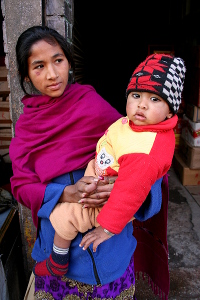 |
|

 Although women make up about half of Nepalís population, the socio-political and cultural norms that run strong in the country prevent women from having an active and productive role in society, and often bind them to the domestic sphere. By ignoring half of its populationís potential, not only is Nepal stunting its economic, social and political growth Ė a crucial point in a country attempting to emerge from decades of conflict and instability Ė but it is also preventing millions of women from living a dignified life, with negative effects on their education, political awareness and independent decision-making.
Although women make up about half of Nepalís population, the socio-political and cultural norms that run strong in the country prevent women from having an active and productive role in society, and often bind them to the domestic sphere. By ignoring half of its populationís potential, not only is Nepal stunting its economic, social and political growth Ė a crucial point in a country attempting to emerge from decades of conflict and instability Ė but it is also preventing millions of women from living a dignified life, with negative effects on their education, political awareness and independent decision-making.
Womenís status varies throughout the dozens of ethnic groups that constitute Nepalís diverse population, but it is generally the case that women have very little voice and are expected to follow their defined, often domestic, role. This lopsided relationship between the sexes is reproduced at all levels of society, and has not only led to high levels of domestic violence and female depression, but has also led to women void of self-confidence or feeling of worth and potential.
Although there is a legal official minimum representation of women in certain areas of politics (i.e. 33% in Parliament), the women involved in decision-making often have very little political know-how or skills to effectively exercise their power, due to the lack of education available to them. This often leads to an exacerbation of the caste-system and discriminatory practices, as those involved in political decisions are those with ready access to education, i.e. the men and upper-caste, who are unlikely to represent the needs of the women and lower-castes.
The political instability in the country has also greatly affected womenís positions, as the current lack of constitution or stable government has also meant a lack of protection for the vulnerable members of society, leaving many cases of contestation over issues such as inheritance to women heirs, divorce cases and child custody as well as widows' and lower-castes' rights.
The conflict that raged throughout the country for more than a decade affected and destroyed thousands of lives, notably that of women. Many families have lost the traditional male breadwinner within the family, and women are therefore forced to take on this burden on top of their own duties, with little social recognition. There is also certain stigma towards post-conflict victims, as well as towards widows and old women, as they are regarded by some community leaders as economically unproductive. Many of these women are in dire need of support, not only economic but also from the trauma of having lived through a war zone and the direct consequences that result from it.
The nation's political standstill as well as the process of cultural globalization and family and societal pressures have also had a massive negative impact on Nepalís urban youth, often leading them to feel ostracized and apathetic.
They have little interest in participating in their country's nation-building process and often lack long-term goals for themselves. Like the women, they also suffer from a hierarchical society where they occupy a lower social position depending on their caste, age and employment. The apathy of almost an entire generation is worrying for a nation that is trying to emerge from political instability and economic hardship, and there has unfortunately been no initiative taken by either the government or other NGOs to provide any sort of support for young adults.
Besides being consequences of a patriarchal and post-conflict society, these issues faced by the women and youth of Nepal also stem from obstacles such as the lack of proper sources of information and education, absence of support towards both personal and community empowerment, and no platform to openly discuss issues.
It is these issues that DidiBahini is intent on addressing, by removing obstacles and providing much needed access to information, education and resources. The issues faced by Nepalís marginalized people, particularly women, are deeply embedded in culture and tradition, and therefore very difficult and controversial to combat. However, by empowering both women and youth from below as well as working with politicians at the top, DidiBahini is involving all levels of society in the development process, in order to ensure sustainable change towards a peaceful and equitable Nepal.